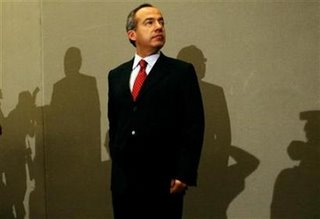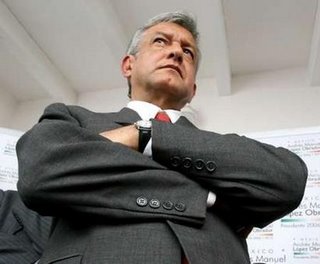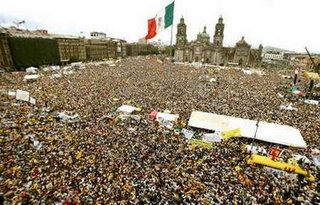 A week ago today, after all votes were officially counted, Mexico’s Federal Election Institute declared Felipe Calderón, 44, of the National Action Party (PAN) the winner – by a razor-thin margin of 243,000 votes out of 41 million or 0.57% – over Andrés Manuel López Obrador, 52, of the Democratic Revolutionary Party (PRD), with Roberto Madrazo, 53, of the Institutional Revolutionary Party (PRI) trailing a distant third.
A week ago today, after all votes were officially counted, Mexico’s Federal Election Institute declared Felipe Calderón, 44, of the National Action Party (PAN) the winner – by a razor-thin margin of 243,000 votes out of 41 million or 0.57% – over Andrés Manuel López Obrador, 52, of the Democratic Revolutionary Party (PRD), with Roberto Madrazo, 53, of the Institutional Revolutionary Party (PRI) trailing a distant third.
And, although pre-election polls predicted it, I was surprised by this close result. After all, the governing platforms the frontrunners laid out for Mexico’s future could not have been further apart: For example, López Obrador championed a socialist agenda headlined by New Deal-style public works (including a new transit system and subsidized housing) to stimulate employment and stem migration to the United States; Whereas, Calderón tendered a market-oriented agenda based on attracting foreign investments to create jobs and provide Mexicans vested incentives to stay home.
 No one was surprised on Sunday, however, when López Obrador filed a formal complaint in which he claimed to be the legitimate president-elect, charged that the results were rigged and demanded a Florida-style manual recount of all 41 million votes. But, despite his populist argument that Calderón is attempting to do to him what George W. Bush did to Al Gore (the candidate who many people throughout the Americas still believe won the 2000 U.S. presidential election), all indications are that he will suffer Gore’s fate as well.
No one was surprised on Sunday, however, when López Obrador filed a formal complaint in which he claimed to be the legitimate president-elect, charged that the results were rigged and demanded a Florida-style manual recount of all 41 million votes. But, despite his populist argument that Calderón is attempting to do to him what George W. Bush did to Al Gore (the candidate who many people throughout the Americas still believe won the 2000 U.S. presidential election), all indications are that he will suffer Gore’s fate as well.
Indeed, I suspect it will be thus, notwithstanding López Obrador’s sensational claim that he has “irrefutable video proof” of fraud committed by Calderón’s supporters. Because, ironically, it is generally accepted amongst international election observers that Mexico’s electoral system is far more impervious to fraud than the U.S. system.
Moreover, where Gore could at least appeal to federal authorities about alleged fraud by state election and judicial officials, López Obrador faces the (institutionally) prohibitive challenge of having to argue to Mexico’s seven-member Federal Electoral Judicial Tribunal that their federal election colleagues – who now run the country’s presidential elections – conspired to steal the election from him.
Yet he seems encouraged in his ill-fated pursuit by political pundits at home and abroad who have cited this 2000 U.S. presidential election as the casus belli for his fight – as if it was the first disputed election in the annals of democracy.
Of course, one can be forgiven the impression that close election results giving rise to such challenges originated with Al Gore. But charges of gerrymandering, buying votes and rigging election results have figured in American politics since the founding of the republic 230 years ago. (See, inter alia, disputed presidential elections of 1800, 1824, 1876, 1960)
What seems a more recent phenomenon, however, is that as despotic and totalitarian countries embraced democracy, they also emulated many of the unseemly political practices that polarized their electorates. Therefore, it should not have come as a surprise that disputed elections were held in places like Georgia in 2003, Ukraine in 2004, Togo and Ethiopia in 2005, and Belarus earlier this year.
 Thousands of López Obrador’s supporters on Sunday protesting the official election results
Thousands of López Obrador’s supporters on Sunday protesting the official election results
And, no matter how unfounded, López Obrador’s charge that more fraud was committed in this democratic election than was ever committed during the 71 years of one-party rule by the PRI (until outgoing President Vicente Fox of the PAN broke their monopoly in 2000) has considerable resonance amongst Mexicans. Focusing on that charge, however, may cause one to miss the real story:
After all, this election was billed as the most important battle of ideologies to date between the socialist insurgency being led by Venezuelan President Hugo Chavez (with his avowed comrade-in-arms, López Obrador, standing as his proxy) and the beleaguered democracy crusade being proselytized by American President George W. Bush (with his wary conservative soul mate, Felipe Calderón, standing as his proxy). But, as Bush himself has demonstrated in rather notorious fashion, no matter how razor-thin the margin: A win’s a win!
Morever, Calderón’s victory portends a (watershed) backlash against Chavez’s insurgency. Because, as Chavez was busy buying up friends throughout the Caribbean with his PetroCaribe initiative, Bush-friendly governments were being elected right in his backyard. For example, just last month, Peruvians and Columbians elected leaders who openly denounced Chavez as a power-hungry dictator attempting to dominate regional politics in the very manner he condemns Bush for trying to do.
Alas, it seems more and more countries throughout Latin America are seeking refuge in the proverbial idiom: Better the devil you know than the devil you don’t….And, where just months ago bashing Bush was a winning strategy in national elections, bashing Chavez now seems a more prudent campaign tactic.
NOTE: Since his foreign policy initiatives in the Middle East and Asia seem doomed to chaos and uncertainty for the remainder of his presidency, Bush can derive some consolation from the fact that in conservative Steven Harper of Canada and Calderón of Mexico he will have leaders on his borders who share his world view (especially on immigration, NAFTA and FTAA).
Felipe Calderón, Andrés Manuel López Obrador, Mexican election
Rick www.weblogbahamas.com says
We have had our share of disputed elections here in The Bahamas as well as you know.
In a democracy it seems best to slow up on the rhetoric, put your case to the election court and peacefully await the ruling.
If you lose, you hit the ground running and begin you campaign in earnest to win the election the next time around.
Unfortunately some countries do not have the privilege of “free and fair” elections.